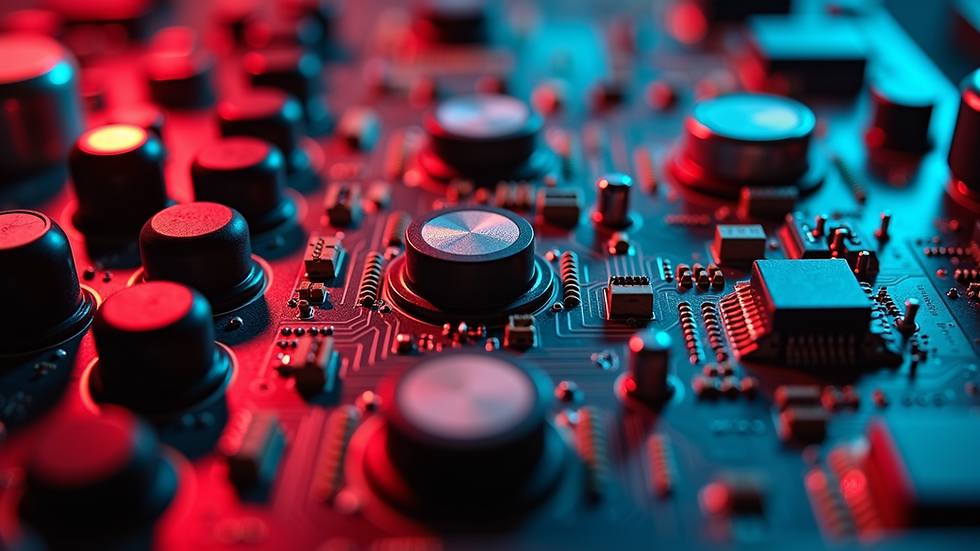The Skills Needed to Become an Arcade Machine Expert
- Chris Jackson

- Jul 29, 2025
- 4 min read
Arcade machines have a nostalgic charm that continues to captivate enthusiasts and gamers alike. Behind the scenes, skilled professionals ensure these machines run smoothly and remain in top condition. Becoming an arcade technician expert requires a unique blend of technical knowledge, problem-solving skills, and a passion for arcade culture. This article explores the essential skills needed to excel in this fascinating field.
Understanding the Role of an Arcade Technician
An arcade technician is responsible for maintaining, repairing, and restoring arcade machines. These machines can range from classic pinball games to modern video arcade cabinets. The role demands a deep understanding of both electronic and mechanical systems.
To succeed, an arcade technician must be comfortable working with circuit boards, wiring, and software. They also need to diagnose issues quickly and efficiently to minimise downtime. For example, a technician might troubleshoot a faulty joystick or repair a broken coin mechanism.
Practical skills such as soldering, wiring, and reading schematics are crucial. Additionally, knowledge of vintage electronics and modern gaming technology helps technicians adapt to various machine types.

Close-up view of an arcade machine circuit board showing electronic components
Essential Skills for an Arcade Technician
Becoming an expert arcade technician involves mastering several key skills:
Electronics Knowledge
Understanding electronic components like resistors, capacitors, and microcontrollers is fundamental. This knowledge allows technicians to identify and replace faulty parts.
Mechanical Aptitude
Many arcade machines have mechanical parts such as gears, levers, and motors. Being able to repair or replace these components is essential.
Problem-Solving Abilities
Diagnosing issues requires logical thinking and patience. Technicians often face complex problems that need creative solutions.
Software Familiarity
Modern arcade machines may run on specialised software or firmware. Knowing how to update or reinstall software can be a valuable skill.
Attention to Detail
Small mistakes can cause significant problems. Precision in repairs and maintenance ensures machines operate reliably.
Customer Service Skills
Technicians often interact with arcade owners or operators. Clear communication and professionalism help build trust and repeat business.
Safety Awareness
Working with electrical components requires strict adherence to safety protocols to prevent accidents.
By developing these skills, aspiring arcade technicians can build a strong foundation for their careers.
What does an arcade technician do?
The daily tasks of an arcade technician vary but generally include:
Routine Maintenance
Regular cleaning, lubrication, and inspection of machines to prevent breakdowns.
Troubleshooting and Repairs
Identifying faults in hardware or software and fixing them promptly.
Restoration Projects
Bringing vintage arcade machines back to life by replacing worn parts and refurbishing cabinets.
Upgrades and Modifications
Installing new features or improving existing ones to enhance gameplay or reliability.
Testing Machines
Ensuring all functions work correctly before returning machines to service.
For example, a technician might receive a pinball machine with a malfunctioning flipper. They would inspect the solenoid coils, check wiring connections, and replace any damaged parts. After repairs, they would test the flipper's responsiveness to confirm the fix.

Eye-level view of an arcade technician repairing the internal components of a pinball machine
Training and Education Pathways
While some arcade technicians are self-taught, formal training can accelerate skill development. Here are some common pathways:
Electronics Courses
Enrolling in basic electronics or electrical engineering classes provides foundational knowledge.
Apprenticeships
Working under experienced technicians offers hands-on experience and mentorship.
Online Tutorials and Forums
Many communities share repair guides, schematics, and troubleshooting tips.
Manufacturer Training
Some arcade machine manufacturers offer specialised training on their products.
Technical Certifications
Certifications in electronics or IT can enhance credibility and job prospects.
Practical experience is invaluable. Aspiring technicians should seek opportunities to work on real machines, whether through volunteering, internships, or personal projects.
Tools and Equipment Every Arcade Technician Needs
Having the right tools is essential for effective repairs and maintenance. Some must-have items include:
Multimeter
For measuring voltage, current, and resistance.
Soldering Iron
To repair or replace electronic components.
Screwdrivers and Nut Drivers
Various sizes for opening cabinets and accessing parts.
Wire Strippers and Cutters
For preparing and repairing wiring.
Cleaning Supplies
Brushes, compressed air, and contact cleaner to maintain components.
Replacement Parts
Common spares like fuses, bulbs, switches, and connectors.
Diagnostic Software
For machines that require firmware updates or software troubleshooting.
Investing in quality tools improves efficiency and the quality of repairs.

High angle view of essential tools used by an arcade technician on a workbench
Building a Career as an Arcade Technician
To establish yourself as a professional arcade technician, consider these steps:
Gain Experience
Start with small repair jobs or volunteer at local arcades.
Network with Industry Professionals
Join online forums, attend gaming conventions, and connect with arcade owners.
Create a Portfolio
Document your repair projects with before-and-after photos and detailed descriptions.
Offer Reliable Service
Build a reputation for quality work and timely repairs.
Stay Updated
Keep learning about new arcade technologies and repair techniques.
Consider Specialisation
Focus on a niche such as pinball machines, classic arcade cabinets, or modern video games.
For those interested in professional support or training, consulting an experienced arcade machine technician can provide valuable insights and guidance.
The Future of Arcade Technician Skills
As arcade technology evolves, so do the skills required. Emerging trends include:
Digital Integration
More machines use digital displays and network connectivity.
Software Development
Technicians may need basic coding skills to troubleshoot software issues.
3D Printing
Custom parts can be fabricated to replace obsolete components.
Sustainability Practices
Eco-friendly repair methods and energy-efficient upgrades are gaining importance.
Adapting to these changes will keep arcade technicians relevant and in demand.
Becoming an arcade technician expert is a rewarding journey that combines technical expertise with a love for gaming culture. By developing the right skills, gaining hands-on experience, and staying current with industry trends, you can build a successful career maintaining and restoring these iconic machines. Whether you are repairing a classic pinball or upgrading a modern arcade cabinet, your work helps preserve a beloved form of entertainment for generations to come.



Comments